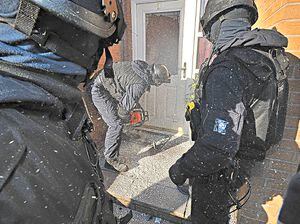Police chief: We are determined to draw the line on crime
Long-term solutions are the key to cracking crime, says Shropshire police Chief Superintendent Kevin Purcell.

In the past few years there has been an increase across the country in an organised drug crime known as ‘County Lines’.
County Lines sees urban organised groups exploit young or vulnerable people to sell drugs across county boundaries in rural towns.
It is a tactic used by these groups to facilitate selling drugs in towns outside of the area they live, using a dedicated mobile phone line to orchestrate drug supply.
Drug dealers involved in County Lines often adopt a process known as ‘cuckooing’ where they befriend someone who is vulnerable, quite often it will be someone who lives alone, and take over their home, using it as a local base for drug dealing.
Like a cuckoo the dealer moves in and takes over the property before moving on to their next target before they get caught. They will also exploit young and vulnerable people to deal their drugs for them.

This is a national issue and unfortunately, we are no different in Shropshire to other parts of the country. We have seen this practice take place in towns across the county and we have seen vulnerable people targeted and exploited.
As policing lead across Shropshire and Telford I want to make sure we are sending a clear message to these criminals that they are not welcome in our county, that we will do all we can to relentlessly pursue them and disrupt and dismantle their organised crime.
Information we receive from our local communities is absolutely crucial in helping us to build a picture of what is going on and we want to hear from anyone who thinks ‘county lines’ is happening in their neighbourhood.
Key signs to look out for are increased visitors to an address – does the person live alone? Could they be deemed vulnerable? Has the number of people visiting them suddenly increased? Are people coming and going at odd times? Is there evidence of drug use in public areas?
If it is a flat with secure entry, have secure doors been left wedged open? Has there been an increase in noise and anti-social behaviour associated with the address? All of these could be signs cuckooing is taking place, if you’re concerned let us know.
SEE ALSO:
Looking at longer term solutions can play a vital part in our work to tackle not just County Lines but many other issues we can face. In policing we’re very good at providing quick time solutions to immediate issues, we respond to incidents and make a quick assessment of the situation and what we need to do to resolve it, whether that be arrest a violent offender, close a road so a collision can be dealt with safely with minimum disruption or take a vulnerable child into police protection because they are at immediate risk.
All of this is the very essence of policing. What is also really important though, and often something that goes unnoticed, is the importance of problem solving and looking at longer term solutions to prevent things escalating in the first instance. There is no doubt policing is facing increasing demands and challenges and it’s important we do all we can to make sure we serve our communities effectively and are there for those who need us the most.
Problem solving can play a crucial role in preventing something before it escalates for either police or our partner agencies and right across the county we constantly look at how we can look at longer terms solutions to help resolve issues so they’re no longer a concern, for example we may look at why someone is persistently offending and, in partnership with other agencies, look at what can be put in place to help stop this. Often, police alone cannot resolve these issues and we very much work in partnership with a range of agencies to find these longer term solutions.
Looking at longer term solutions will also include making sure some of our most vulnerable victims have the support they need to help prevent them from being a victim, for example we will ensure victims of domestic abuse have a wraparound service of support to help them break free from the cycle of abuse they suffer. On average a victim of domestic abuse will suffer around 30 incidents before they come forward and report these, this is too many.
In fact, one incident is one incident too many and I want victims of domestic abuse to feel they can come forward and report this to us without fear of repercussions, we will make sure they have the right support they need to protect them from the abuser. We simply won’t tolerate domestic abuse and will take a tough stance on perpetrators, anyone responsible for a domestic-related incident will be arrested.





